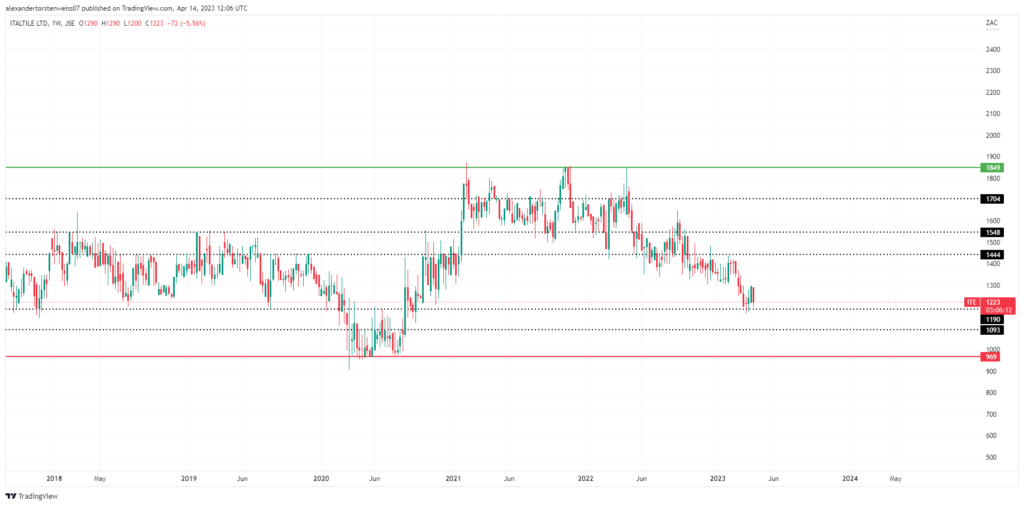
Italtile Limited (JSE: ITE), the South African manufacturer, franchisor and retailer of tiles, bathroom ware and related home-finishing products, saw its half-year profits slip amidst a turbulent macroeconomic environment where “an erosion of consumer spending power due to rising interest rates and elevated inflation” cut into the group’s bottom-line figure. South Africa’s largest retailer of bathroom tiles expressed that its depressed profit growth can also be due to a decline in the recent “Covid-19 inspired home improvement boom.”
Macroeconomic Environment:
In its reviewed financial results for the half-year period that ended 31 December 2022, Italtile emphasised that consumers’ disposable income has been under severe distress due to surging interest rates and a rapid rise in “basic living costs, specifically transport and food expenses.” During the Covid-19 pandemic, where central banks cut interest rates to stimulate global economies amidst extended lockdown periods, activity in home renovation boomed. However, throughout the 2022 financial year and well into 2023, rapidly rising interest rates have seen a declining trend in housing improvement projects.
Rolling blackouts amidst South Africa’s ongoing energy crisis have done no favours for Italtile Limited as consumers divert “already constrained disposable income away from home improvement projects to alternative energy solutions.” Loadshedding has emerged as a familiar yet highly unpopular theme among South Africans as rolling blackouts intensified during the second half of 2022, which saw a slump in financial performance for Italtile for the six months that ended 31 December 2022.
Following the release of Italtile’s financial results for the half-year period that ended 31 December 2022, the group expressed concern over “continued volatility in the global environment and instability in the local economy,” emphasising that “specific guidance regarding future performance would be ill-advised.” The group anticipates projected interest rate hikes to depress consumer demand and investor confidence in the short term, which could potentially see the price action on Italtile Limited trend lower.
Fundamental Analysis:
Italtile Limited saw its revenue increase by a measly 3% to R4.96 billion for the six months to 31 December 2022, slightly up from the prior year’s half-year figure of R4.80 billion. The group’s half-year profit sunk to R997 million, representing a 7% reduction from the preceding year’s half-year figure of R1.07 billion. The slip in profitability can be mainly attributed to a notable decline in activity related to home renovation projects. Rising interest rates have significantly reduced consumers’ disposable income. At the same time, South Africa’s ongoing energy crisis has forced many consumers to divert spending away from residential refurbishment projects to alternative energy solutions. The combination of rising interest rates and rolling domestic blackouts has seen a significant decline in spending related to housing improvement, paving the path for the downtrend in Italtile’s share price.
Macroeconomic headwinds and the local energy crisis saw Italtile report an earnings per share (EPS) figure of 79.5 cents for the half-year period that ended 31 December 2022, 5% down from the prior year’s half-year figure of 84 cents. Moreover, the group saw a 9% year-over-year increase in operating expenses to R1.025 billion for the half-year ended 31 December 2022, up from R938 million a year prior. Despite a 7% rise in general selling prices, the group’s trading profit slumped 8% year-over-year to R1.38 billion as volumes fell due to a shift in consumer spending away from home refurbishment.
Looking at Italtile’s balance sheet, current assets surged by a tremendous 23% year-over-year to R3.14 billion for the six months that ended 31 December 2022, up from R2.56 billion a year prior. The double-digit growth in current assets is mainly due to a notable incline in inventories, which ticked up 26% year-over-year to R1.36 billion in 2022 from R1.085 billion for the prior year. The significant increase in inventories reflects the company’s “strategic decision to retain higher than historical levels of raw materials and business-critical in-demand stock to serve as cover against supply chain delays and pricing volatility.”
Looking at the group’s condensed cash flow statement, cash generated by operations increased by a relatively poor 2.4% to R1.65 billion for the six months to 31 December 2022. However, cash inflow from operating activities surged by a stellar 255% year-over-year to R909 million, primarily due to a 61% year-over-year reduction in half-year dividends paid. Moreover, cash outflow from investing activities decreased by 31% year-over-year to R362 million from R524 million a year prior, reflecting a notable decline in investing activities. Cash outflow from financing activities fell 44% year-over-year to R148 million from R265 million in 2021. Overall, Italtile Limited reported a 51% year-over-year increase in cash and cash equivalents to R830 million as cash inflows from operating activities surged. The notable decline in cash outflows from investing and financing activities also played a significant role in the rise in cash and cash equivalents.
Over the last three years, Italtile has seen its trailing twelve-month (TTM) price-to-earnings (P/E) ratio trend lower from a multiple of 15.3x for the 2020 fiscal year to a current multiple of 8.3x. Generally speaking, a declining P/E ratio indicates that a company’s stock price is becoming less expensive relative to its earnings, potentially suggesting that the market has adopted a less optimistic view of Italtile’s future earnings growth prospects, possibly due to recent macroeconomic trends supporting a diversion of consumer spending away from home renovations. The downtrend in the group’s trailing twelve-month P/E ratio could also reflect changing investor sentiment. Market participants may be less willing to pay a premium for the stock’s earnings as general market consensus points toward a less optimistic view of Italtile’s future growth prospects. Alternatively, on the other side of the spectrum, the relatively low current P/E multiple may indicate that the stock is potentially undervalued. Still, investors should remain cognisant of a potential value trap, where the share appears undervalued based on traditional valuation metrics yet fails to deliver the expected investment returns.
Technical Analysis:

Looking at the 1W price action chart on Italtile Limited (JSE: ITE), the share price rallied impressively throughout 2020, consolidated sideways throughout most of 2021 and has seen a downtrend over the 2022 fiscal year and well into 2023.
The price action on Italtile has recently traced lower toward the R11.90 support level (black dotted line). Should the R11.90 support level come into play, it could be watched closely as a potential re-entry point for bullish investors who believe the share price could retrace and trend higher. Alternatively, should the R11.90 support level fail to hold, the bears could see the price trend lower toward the R10.90 support level (black dotted line), a share level toward the primary support level at R9.70 (red line).
Fundamentally, it is unlikely that the 2020 share price rally will be repeated, primarily due to substantially different macroeconomic trends and headwinds currently facing South Africa’s largest retailer of bathroom tiles. As mentioned, the 2020 and 2021 fiscal years were predominantly marked by low interest rates and extended lockdown periods, which saw consumer spending on home refurbishing projects surge, paving the path for Italtile’s share price to rally throughout the second half of 2020 and into the early months of 2021. After that, rising interest rates from a global perspective and domestic energy constraints haven’t boded well for market sentiment, which has recently seen the share price on Italtile trend significantly lower.
Sources: Italtile Limited, Koyfin, Trading View
Disclaimer: Trive South Africa (Pty) Ltd, Registration number 2005/011130/07, and an Authorised Financial Services Provider in terms of the Financial Advisory and Intermediary Services Act 2002 (FSP No. 27231). Any analysis/data/opinion contained herein are for informational purposes only and should not be considered advice or a recommendation to invest in any security. The content herein was created using proprietary strategies based on parameters that may include price, time, economic events, liquidity, risk, and macro and cyclical analysis. Securities involve a degree of risk and are volatile instruments. Market and economic conditions are subject to sudden change, which may have a material impact on the outcome of financial instruments and may not be suitable for all investors. When trading or investing in securities or alternative products, the value of the product can increase or decrease meaning your investment can increase or decrease in value. Past performance is not an indication of future performance. Trive South Africa (Pty) Ltd, and its employees assume no liability for any loss or damage (direct, indirect, consequential, or inconsequential) that may be suffered from using or relying on the information contained herein. Please consider the risks involved before you trade or invest.




